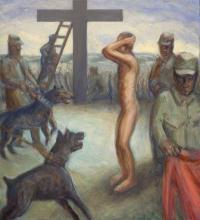Suffering

IN THE PAST 150 years, the songs historically known as “Negro spirituals” have worn many costumes. They emerged, of course, from the Deep South during the days of slavery, when songs such as “Every Time I Feel the Spirit” or “Wade in the Water” were first sung by anonymous psalmists wielding hoes or pulling cotton sacks. Since that time they’ve been dressed in the style of the European art song, sung as grand opera, or even faithfully mimicked by well-meaning white folk singers.
The spirituals entered the mainstream of American culture through the performances of the Fisk Jubilee Singers from Fisk University in Nashville who, fresh out of slavery themselves, toured the North in the 1870s. In the 1950s and ’60s, the old standards were resurrected, and slightly rewritten, as marching songs for the African-American freedom movement and then echoed across the world as anthems for human rights from South Africa to Northern Ireland to Eastern Europe.
After all that, the spirituals can probably even survive being remade into “smooth jazz,” which is more or less what happens to them on Bobby McFerrin’s new album Spirityouall. Readers of a certain age might remember McFerrin as the guy who, in 1988, conquered the known pop music universe with an airheaded ditty called “Don’t Worry, Be Happy.” The tune was so infectious that it should have had a warning label from the Centers for Disease Control, but instead it dominated radio, won some Grammys, and, to McFerrin’s eternal horror, was used as theme music by the George H.W. Bush presidential campaign.

Memorial Day is a day to remember. A solemn holiday, it reminds us of the men and women who have died serving our country. Wreath-laying ceremonies and concerts fill the weekend, along with the placing of 250,000 American flags on the graves of Arlington National Cemetery.
Decorating graves is the oldest of Memorial Day traditions. In fact, the holiday was originally called Decoration Day and honored the soldiers who died during the Civil War. Flowers were placed on graves every year on May 30, and after World War I the holiday expanded to include soldiers who died in any war. In 1971, it was moved to the last Monday in May to create a three-day Memorial Day Weekend.
And that, writes Everett Salyer of HEAVEmedia, “is when all hell broke loose.” For many Americans, the holiday became a celebratory weekend filled with grilling meat, drinking beer, splashing in pools, and watching stock car races.

In Christianity’s passage through Holy Week to Easter Day, a moment of truth will arrive.
Every detail is well known, thoroughly studied, and dramatized by Hollywood and homespun pageants — and the familiar story will reach across the divide and touch, or try to touch, every person who is listening and watching.
Many will get it, especially if they live in circumstances where people get falsely accused by the self-righteous; where the weak and vulnerable get mistreated by the powerful; where physical suffering is a daily occurrence; where death seems like the only next option.
That audience could well comprise the bulk of humanity — those who endure poverty, starvation, and violence of epic proportions, those who live in more prosperous lands and yet are the oppressed, the ignored, the expendable.
For that audience, the Gospel message is profoundly good news.

HOW SHALL WE engage with scripture through all 50 days of Easter? There are clues in the haunting story of Jesus' appearance beside the sea of Tiberius. After Easter Day many of us are ready to let things quickly revert to normal. It is, strangely, both reassuring and uncomfortable to hear that those disciples, whose business had been fishing, wanted to get back to their boats so promptly after the horrors and wonders they had witnessed in Jerusalem.
Jesus is waiting for them by the shore with breakfast already cooking. All is ready, yet he wants them to bring some of what they haul up in their nets, so he can include samples of their own catch in the menu. And what a catch it was!
Easter is our time to experience the grace that is always ahead of our game and is underway for us before we are ready. Yet grace does not exclude what we bring to the table. Grace expects and includes the work of our hands, the weavings of our imaginations, and the gifts of our unique experiences. In one sense, Eastertide is more truly a season of repentance than is Lent. One thing we might need to repent of is our passivity—those times when we expect God to hand us on a plate the meaning we are hungry for. We need to bring our own bits to the cooking fire if we are to really eat with Jesus. It is part of the mix of grace that we must participate, not just receive.

"THIS IS THE LORD'S DOING; it is marvelous in our eyes. On this day the Lord has acted; we will rejoice in and be glad in it." We will be singing these words from Psalm 118 on Easter Sunday, and they pinpoint a critical issue in our religious witness. Do we have the courage to have God be the subject of sentences, or is God usually the object of our reflections? There is a difference. Do we make ourselves really the subject of our sentences, so that religion is about our doings and ideas and needs? The scriptures insistently talk about what God did and is doing and will do in Christ, the crucified and risen one. Our role is to rejoice in the way God acts upon us, with us, around us, behind us, above us, ahead of us, through us.
Praise is the litmus test. If God is experienced as the one who is acting, the impulse to praise is inevitable. This may help us understand the importance of the psalms in our lectionary. They aren't mere supplementary devotions. As supreme words of praise, they test the authenticity of our reactions to the good news. They test and they can train. The psalter is the church's manual to help practice the "scales of rejoicing," to borrow a phrase from W.H. Auden's "Christmas Oratorio." A phrase on Auden's tombstone comes back to me: "In the prison of his days / Teach the free man how to praise." The psalms come to life only where this teaching is taken seriously.

Hemorrhaging from the concertina
crown, brass knuckles, scourging, cigarette burns,
lurching the last meter of Golgotha
where He must dangle three hours in urns
of japing ether, He drops His bloody tree.
Executioners rip His clothes away,
cut cards for His keepsake convict jersey.
THREE OF THE best films of the year arrived in early fall and will hopefully still be around to experience by the time you read this. Each deserves to be seen on a big screen—I've long believed that the experience of watching films in a cinema compares with home viewing the same way that visiting the pyramids compares with seeing a mummy in a museum. But whether or not you see these in a cinema, please do see them.
Samsara, Looper, and Seven Psychopaths open up worlds of possibility where the varieties of human experience are respected, the myth of the cool assassin is revised, and the morality of violent fiction is stared in the face, interrogated, and not let go without an attempt at a convincing answer.
Samsara, the sequel to 1992's Baraka, travels the world seeking examples of our diversity and unity: dancers and warriors and builders and menders, broken things and healed things, innocent and wounded. It contains some of the most extraordinary imagery you've ever seen, in tune with vast musical cultures, reimagining our view of what we, a little lower than the angels, are and can be, and, when we're not conscious of our power, the damage we can do.

IT WOULD BE strange if any segment of the liturgical year left out the theme of migration. The Bible is riddled from end to end with the journeys of nomads, pilgrims, exiles, returning exiles, and the risky intrusions of strangers across boundaries erected to deter them.
This season’s poster child for divinely inspired mobility is the lovely figure of the Moabite “alien” Ruth, who chooses to leave her own country and accompany her beloved Jewish mother-in-law when she returns as a widow to her native Judea. Ruth’s story is romantic, even erotic, as she daringly slips into the arms of Boaz during the sexually charged siesta at the threshing floor. But our readings are no mere novelette. Scripture shows how much hinged on her pluck and her allure. Her great-grandson will be David, and her descendant Jesus the Messiah!
“Where would we be without immigrants?” is one of the many questions between the lines of the scriptures. The Bible has lots to say to us about the divine impulse active in migrations, and the opening of the heart to “strangers within our gates”—things guaranteed to alarm defensive nationalists of every stripe.
I remember the deep spiritual emotion that caught us all up in Boston’s Faneuil Hall during my naturalization ceremony—Cambodian refugees, Vietnamese grandmothers, Salvadoran families, and all the rest of us. I think of the migration of my own great-grandparents to Russia, and the adventures that have scattered my own family from New Zealand to Mexico. How God revels in mixing us all up!

Yesterday, I was walking through Dolores Park and heard a street preacher, saying "If you've ever stolen a stick of gum, then you are guilty of sin! If you've ever looked at Facebook at work, then you've stolen from your employer, and that's sin!"
Of course we all know where he was headed: If we have sinned—even with a trivial infraction like a stick of gum—then God who is holy must punish us for all eternity in Hell unless we accept Jesus right now.
I mean, seriously, gum? Why can't God just get over it? Is God less moral than all of us are? This is not a picture of holiness, it is a picture of a petty tyrant. Aside from the horrible picture of God that this gives us (and honestly, who could ever love, trust, and feel safe around a God like that?), what this ultimately does is trivialize sin. It makes sin into a petty infraction of little consequence.

I struggle to know how much is enough. I hear about Joseph Kony and the many children he’s exploited as child soldiers. I get angry, discouraged. I write about it, talk to friends about it.
And then my life keeps moving and I don’t think about it again for days or weeks.
Trayvon Martin, an unarmed teenager, is gunned down on the street. The nation is divided, both outraged about the killing and fearful of the threat to gun rights and laws of self-defense.
And then we talk about something else.
Today’s issues include the nuns going head-to-head with the Vatican, as well as stories about still more preachers being busted for spousal abuse, or expelled from their jobs because of their sexual orientation.
Tomorrow it will be something else.
One of the drawbacks intrinsic to liturgical worship is the length of time it takes to adopt expressions that are newly current and potent into the approved forms. Certain forms of language become deeply important to a generation—key words and symbols that are pregnant with meaning, yet haven’t been incorporated officially into our forms of worship. So we often feel a certain dissonance in church as the language of worship seems impoverished by the absence of expressions we value so highly in our own exploration into God today. I long for prayers that express, directly and passionately, that God suffers. I look forward to praising God’s vulnerability. I am impatient for the recasting of prayer to praise the Creator in terms that unequivocally embrace the evolutionary perspective. In the meantime, preaching is the key field for using this fresh language with passion, in an exciting conversation with ancient expressions and classic symbols that can never become out of date, as long as we use our imaginations to keep on releasing their latent powers.
The scriptures in this season provide rich opportunities for exploring great images of God’s transforming power in vulnerability. Has anyone coined the word “paradoxology” yet to express the essence of transformative Christian worship? Only paradoxical language can point with any degree of success to the mystery of God and the revelatory revolution that springs into life out of the action of Jesus, the passion of Jesus, and the resurrection of Jesus.

I was pretty sure my parents were insane when I was a kid. It never made any sense to me when they’d talk about how they’d rather have something bad happen to them instead of to me.
Well folks, that makes three of us, I guess. Being the good little narcissist, I agreed that I didn’t want anything to happen to me, damn the consequences to anyone else. We all go through that developmental stage; some grow out of it and others, not so much. It takes time, experience, wisdom and a broadening of perspective to understand that the avoidance of suffering, in itself, is not the end-game of life.
It’s even harder to understand suffering as a gift.

I’ve never liked the fact that we call the day on which we remember Jesus’ crucifixion “Good Friday.” What’s so good about it anyway? Personally I find the entirety of Holy Week – save for Easter – pretty depressing. Sure, the days are getting longer and things have started to grow all around us, but until Easter, the focus of the week is the suffering and death of an innocent man.
It turns out that, although plenty of folks have their own explanations, nobody actually knows why we call it Good Friday. I think the Germans are spot-on by calling it Karfreitag, which means “Suffering Friday.”
Figures the Germans would be more content to sit with suffering than the rest of us. They’re so serious! But I digress…

Someone beloved to me is suffering from a horrific disease right now. If I could fight this disease with a sword all my pacifist tendencies would run screaming for the hills and I would take up that sword and I would fight. Just the thought raises a rage up within me that is passionately intense and I long for such a sword.
I can’t help but think that Jesus must have felt some of this, human as he was. Because of who he was and what he did the poor and the outcast and the sick were drawn to him and so he saw suffering every day. He healed and he taught and he called for others to follow him, yet the suffering still was all around. Some part of his humanity must have wanted to take up a sword and fight it. Yet he knew that violence was not the answer.
There was another way.
So instead of a sword, he took up... a towel and filled a basin with water.
It had been more than a week since the doctors had moved me into the ICU, and more than a week since I had tasted anything liquid.
My tongue was dry and felt like leather. At night, I would watch the machines around me blink. The IV bags hung next my bed and scattered the light across sterile white walls.
 I tried not to cry when I could no longer control my bowels. I lay there in my own filth waiting for a nurse to rescue me.
I tried not to cry when I could no longer control my bowels. I lay there in my own filth waiting for a nurse to rescue me.
I came into the world unable even to clean myself and now it seemed I would leave it in the same state.
Finally the nurse arrived to help me.
“I’m thirsty,” I told her. “May I have an ice cube?”
She said no.
“Please? My mouth is so dry. Just an ice cube,” I begged.
“No.”
Oxygen tubes inserted into my nostrils had rubbed my nose raw. I pulled them out.
I felt relief. I watched the numbers drop on the LCD screen. An alarm sounded.
I tried to put the tubes back when the nurse ran in.
“Mr. King, you need the oxygen,” she chided, skillfully replacing al the tubes and checking all the machines and medicines that flanked my hospital bed — all the things that were keeping me alive.

Forgiveness is a form of suffering. Yes, you read that right.
Most of us talk about forgiveness and always speaks of how wonderful it is. But there is a reason so many can’t seem to forgive — it requires a willingness to suffer.
When people commit an offense against us, our natural inclination is to commit an offense against them. Not just any offense, but an offense that is bigger, badder, and one that hurts far more.
We call this revenge.
We tell ourselves that justice has been served, and believe this because deep inside of us, it feels really good to get even. Except, we didn’t get even — we got ahead. So vengeance will come back around to us. We will receive pay back, and then we will pay it back again. On it goes with vengeance — it never ends.

This is true of any bad news, really. When I feel sick. When I don’t get my way. When I’ve had a bad day. You name it. If it’s negative, then I look forward to sharing it. I don’t mean to; I just do.
I sense this is normal, but it doesn’t make it right.
FoxNews shuns pro-immigrant voices. How do we repair souls returning from the war? Does Christianity translate into public policy? Lobbyists role in 2012 fundraising. Oakland mayor promises "minimal police presence" at OWS protests. Cain says he doesn't need to know foreign policy details. And only 40 percent of Americans correctly identify Romney as Mormon.
A truck bomb has killed at least 70 people in the Somali capital of Mogadishu, including a crowd of young students applying for scholarships to study abroad.